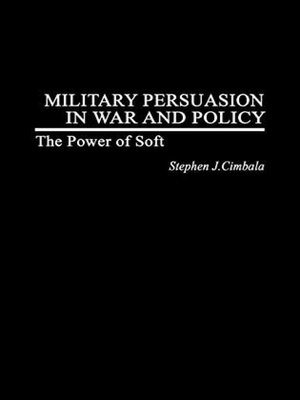
Sign up to save your library
With an OverDrive account, you can save your favorite libraries for at-a-glance information about availability. Find out more about OverDrive accounts.
Find this title in Libby, the library reading app by OverDrive.



Search for a digital library with this title
Title found at these libraries:
| Library Name | Distance |
|---|---|
| Loading... |
Cimbala analyzes military persuasion—the art of using armed force to support diplomacy, deterrence, crisis management, unconventional conflicts, peace operations, and other military activities short of major conventional war. As he shows, military persuasion requires that policy makers and diplomats understand the subtle interaction between force and diplomacy; each supports, or destroys, the other, depending upon the situation. Even conventional wars have aspects of armed persuasion. The Powell doctrine that calls for overwhelming force in case of any U.S. military intervention was not even employed by then Chairman of the Joint Chiefs of Staff Colin Powell in the Gulf War of 1991, despite the popular impression to the contrary. Since U.S. policy is not based on imperial policing, but on constructive engagement with the object of supporting democratic regimes and market economies, the use of deterrence and limited military commitments of highly trained, specialized warrior-diplomats will be typical of 21st century-conflicts.
As Cimbala shows in his various case studies, armed forces are used most of the time for coercion, not for mass destruction. Yet much professional military thinking, expert lay opinion, and U.S. government analysis presupposes that there is a clear dividing line between all-out peace and all-out war. In addition, U.S. political culture is insensitive to the requirement for matching the political objective to the military means available, as opposed to clamoring for a psychologically satisfying form of victory. Despite these apparent obstacles, Cimbala maintains that the United States must master military persuasion because its resources for defense are limited and its commitments are ubiquitous. This book will be of particular interest to scholars, students, and professionals involved with defense, security, and foreign policy studies.
As Cimbala shows in his various case studies, armed forces are used most of the time for coercion, not for mass destruction. Yet much professional military thinking, expert lay opinion, and U.S. government analysis presupposes that there is a clear dividing line between all-out peace and all-out war. In addition, U.S. political culture is insensitive to the requirement for matching the political objective to the military means available, as opposed to clamoring for a psychologically satisfying form of victory. Despite these apparent obstacles, Cimbala maintains that the United States must master military persuasion because its resources for defense are limited and its commitments are ubiquitous. This book will be of particular interest to scholars, students, and professionals involved with defense, security, and foreign policy studies.







